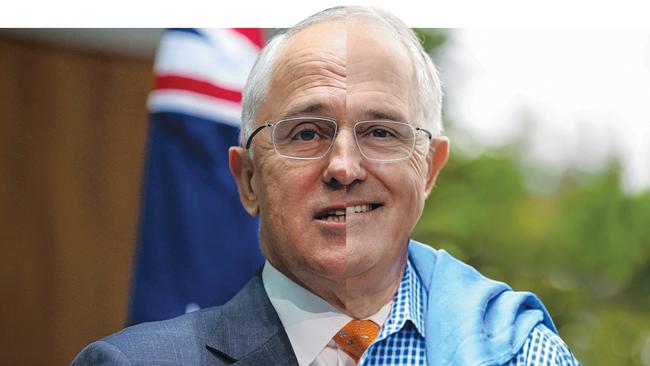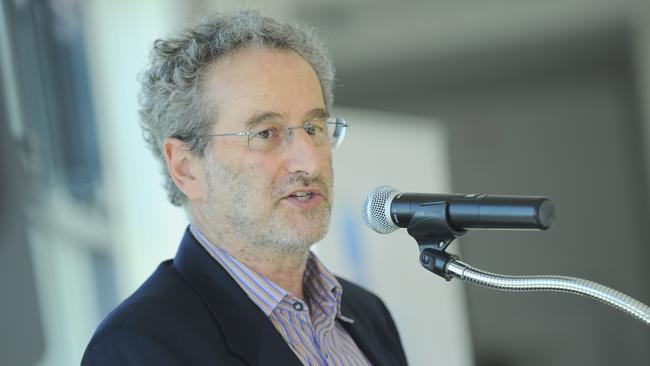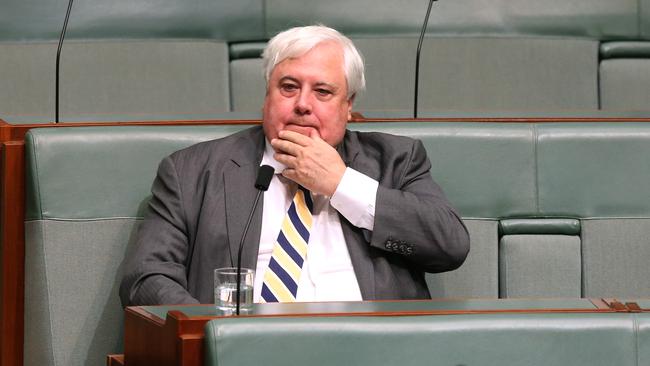Prime Minister Malcolm Turnbull an outsider in search of a political sweet spot
MALCOLM Turnbull is an undeniably clever man but whether his skills are politically potent will be revealed over the next two months, writes Shaun Carney.

Opinion
Don't miss out on the headlines from Opinion. Followed categories will be added to My News.
A FEW days ago a political journalist friend texted me when sections of the media started making something of Malcolm Turnbull’s offhand suggestion to the ABC’s Jon Faine that the broadcaster should chip in to help his children buy property if he was so concerned that high prices might cause them to miss out.
My friend disdained “that sort of journalism” — gotcha reporting that strips remarks of their context. I couldn’t agree. True, the Prime Minister’s advice on “intergenerational equity” was meant to be flippant.
It was one very rich guy having a lighthearted exchange with another well-off dude.
But what the heck was Turnbull thinking, indulging in that on-air banter the morning after the Budget was delivered and only a few days before kicking off an eight-week election campaign?
The episode captured the aspect of Turnbull’s personality that’s always caused me to query his effectiveness as a political leader.
Charm, high intelligence and a lack of self-doubt have all served Turnbull well throughout his life. They got him through some rough parts of his early years and he was able to use them as a university student, convincing the panel entrusted with allocating Rhodes scholarships to bestow one upon him.
He had an innate ability to persuade powerful men to give him opportunities and access. He became a trusted adviser to Kerry Packer and went into business with former NSW premier Neville Wran.
As a lawyer, he established a reputation as a persuasive advocate, particularly adept at dazzling learned judges. Later on he won over the lions of Wall Street when he went into merchant banking.

The Prime Minister has long been comfortable sitting at the top table and being regarded with awe by some.
His story is a lesson to us all: don’t squander your talents and don’t waste your time doubting them.
When you consider that story, his good-humoured jibe at Faine made sense. After all, he has amassed so much personal wealth that he could buy and sell entire neighbourhoods in many Australian suburbs.
That’s a long way from the life experience of not just your average voter but all federal politicians save for Clive Palmer, who’s on his way out of politics after one ill-starred term.
And it’s why the most fascinating aspect of this long election campaign will be to see if Turnbull — an up-close persuader who reflexively trades on his own capacity to charm — can find a sweet spot in which he can be himself while also being politically potent.
During Budget week, he was nowhere near it. First, there was the exchange with Faine.
And then there was his attempt to disown the $48.2 billion cost of his 10-year plan to lower company tax.
When Turnbull took over as PM eight months ago, the public reacted positively at first.
He was the non-Abbott. He promised to eschew slogans and to treat voters as intelligent beings who could tolerate a bit of grey in politics.
A large slab of the electorate felt relieved. He looked and sounded like a PM. The tumult and disappointments of the Rudd-Gillard-Abbott era were over.
But, while Turnbull looks like a prime minister from central casting, he is actually an unusual politician.
He entered parliament late, at 50. Although he had been well known for years when he decided to blast out the sitting Liberal member for Wentworth, Peter King, politics had not been his passion.
His one big public cause had been converting Australia from a constitutional monarchy to a republic, which crashed in the 1999 referendum.
He had not been a big player inside the Liberal Party. He became a minister within a little over two years and leader within four.
And because of his political inexperience and his assumption that his colleagues would stick with him, he was tipped out as leader little more than a year after that.
Since returning to the leadership, his private message to colleagues and others is that he has learned his lesson: no more going off half-cocked and operating inside his own bubble.

Unfortunately, that’s resulted in a hesitant, woolly approach to the job that has sent his early support south.
Commentators keep telling us that the election is Turnbull’s to lose and that he is the government’s best asset.
And yet, the polls suggest that what he has going for him is that he is a bit less unpopular than Labor’s Bill Shorten. The latest Newspoll has his dissatisfaction rating at 49 per cent and his satisfaction at 38. Shorten is on 52 and 33. On voting, the poll has Labor on 51 per cent and the government on 49.
On the upside, his return has put the government in play but that’s all. Turnbull has always demonstrated a desire to lead and to welcome admiration. Being cool and clever has been his calling card. So can he come off as authentic when he switches to robotic sloganeering and scare campaigns?
That’s his challenge, to look genuine, and fully engaged with the lives and concerns of ordinary Australians. The government’s “we have a plan for jobs and growth” mantra has been produced because swinging voters have told pollsters hey believe Turnbull doesn’t have a plan — not for them, anyway.
The one advantage of a marathon campaign is that he has more time to find his sweet spot. If he can’t find it, his next eight weeks will be a slog.
Shaun Carney is a Herald Sun columnist and adjunct associate professor of politics at Monash University


